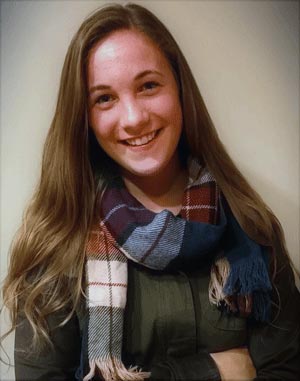Meghan Koop '17
10/19/2016
Meghan Koop worked as a research fellow during the summer of 2016 at the Lupus Foundation of Minnesota. She worked specifically in the Dr. Peterson Immunology Lab at the University of Minnesota.
Tell me a little bit about the responsibilities of your position. What did it entail?
As a Lupus Fellow I had the opportunity to work with physician-researcher Dr. Erik Peterson to design a research project on how a gene variant LypW affects the humoral immune response in Lupus patients against a fungal infection (Candida albicans). With the help of Dr. Peterson and his lab assistant, Dr. Crabtree, I constructed an experimental design in which I would coat a well plate with an extract of the Candida albicans fungus, add Lupus patients' serum to the coated plate and then add a detector solution. This process is called an Enzyme-linked Immunosorbent Assay (ELISA).
Beyond just running the assay, I found value in discussing with Dr. Crabtree the biochemistry behind the ELISA technique and how it works. I ran numerous ELISAs testing for two different blood proteins (IgG and IgM antibodies) that are associated with the humoral immune response. In addition to my research project, I learnt how to genotype Lupus patients blood and had the opportunity to shadow Dr. Peterson in his rheumatology clinic. Shadowing was an invigorating experience because I essentially got to see the manifestations of Lupus and rheumatoid arthritis both in the lab and in the clinic. At the end of my experience, I gave a presentation on my research to members of the Lupus Foundation of Minnesota and scientists from the Immunology Department at the University of Minnesota.
How did CSB/SJU prepare you for the position?
My education from CSB/SJU really prepared me for this position. In many of my courses I became familiar with the experimental design and review of literature that proved useful during my research. The ISCI major aided in my ability to look at a problem from many different backgrounds. For example, in understanding the disease of Systemic Lupus Erythematosus, there are many approaches one can take: the biological symptoms of the disease, the biochemistry behind the immune response, the use of chemistry in laboratory techniques, the prevalence of the disease and sociological factors or the anthropology behind the gene variant LypW. Doing research was the perfect outlet in which I could apply and test the knowledge that I've developed over my years at CSB/SJU.
What were some challenges/experiences that you faced? How did you overcome those challenges?
There were quite a few challenges I had to face. First off, I had to be patient with myself as I gradually learned the background knowledge and research that Dr. Peterson and Dr. Crabtree had a deep understanding of. Secondly, I had to wait a month for the delivery of a particular Candida albicans extract that I would use as my antigen in the ELISA. I couldn't start my experiment without the Candida antigen, so I prepared for experiments by using a different antigen and tested the humoral immune response of carriers and non-carriers of the LypW gene variant in Lupus patients against the influenza virus. This allowed me to practice carrying out the ELISA technique.
Additionally, the inconclusive results of this initial experiment allowed me to ask questions on how to improve my technique, how different blood proteins respond (IgG antibodies versus IgM antibodies) and how the difference in antigen could possibly provide a different result. When the antigen came, over half my research experience was through, yet I was able to perform under pressure and run multiple ELISAs for both IgG and IgM antibodies in my last three weeks. I really enjoyed the process and the challenge of then presenting my research to the Lupus Foundation because it allowed me to share the knowledge I had gained over the summer.
What was your favorite memory?
My favorite memory was getting to know the other members of the Peterson lab and the fun we would have in the lab together. The positive environment in the lab made research more attractive to me. Also, giving a 10 minute presentation on the research I did this summer in front of the president and other members of the Lupus Foundation of Minnesota was a keen memory. It was a great way to wrap up my experience by giving back to the Lupus Foundation of Minnesota.
Advice for students interested in applying for an internship or other positions in research?
In general, research is such a rewarding experience because not only do you gain knowledge and experience but society also benefits from the knowledge acquired from your research. Apply for research in areas that are interesting to you because it allows you to put more meaning behind your work. Going into research, I would encourage having an eagerness to learn and utilize your mentors in order to achieve a deeper understanding of your work.
What are your plans after graduation?
I plan on going to medical school.

